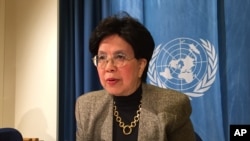World Health Organization chief Margaret Chan attacked the new 12-nation Pacific Rim trade agreement Thursday, saying it could curb the availability of cheaper medicines.
"If these agreements open trade, yet close the door to affordable medicines, we have to ask the question: Is this really progress at all?" Chan said at a health care conference in Geneva.
"Genuine therapeutic breakthroughs increasingly come at an astronomical cost," she said. "Some of the new drugs for hepatitis C cost $1,000 a pill. High prices block access. Hepatitis C affects 150 million people, mostly in poor countries. Unless we get prices down, people will be left behind."
The United States, Canada, Japan, Australia and eight other countries reached agreement on the Trans-Pacific Partnership pact last month after seven years of negotiations, although legislative bodies in the member countries have yet to ratify it.
U.S. President Barack Obama is a vocal supporter of it, saying trade barriers would be cut and common economic rules would be set across 40 percent of the global economy.
But several leading presidential contenders looking to succeed him when he leaves office in January 2017 have voiced their opposition, as have Democratic lawmakers who normally support Obama's legislative initiatives.
Leaders of the $15 billion pharmaceutical industry in India say the Pacific trade deal could end up protecting patented drugs produced by large drug manufacturers inside the trade bloc at the expense of cheaper drugs produced by generic drug manufacturers in India and elsewhere.




